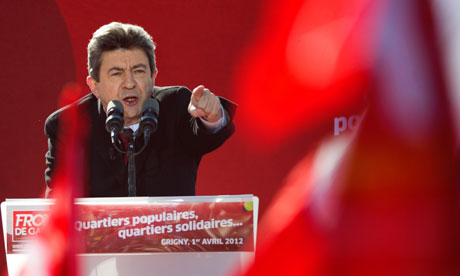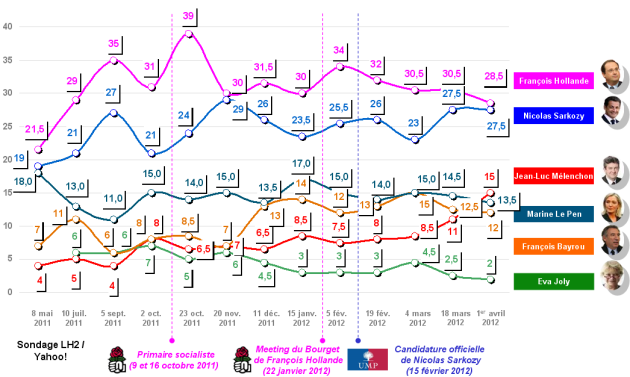Jean-Luc Mélenchon: the poetry-loving pitbull galvanising the French elections
Angelique Chrisafis joins charismatic hard-left firebrand Jean-Luc Mélenchon on the presidential campaign trail
guardian.co.uk, Friday 6 April 2012 14.54 BST
Jean-Luc Mélenchon delivers a campaign speech in Grigny, near Paris. Photograph: Bertrand Langlois/AFP/Getty Images
In a packed agricultural hanger in a rural town in central France, an enraptured crowd raised their fists and chanted: "Resistance! Resistance!" On stage, arms flung wide, sweat pouring down his face, stood the charismatic, hard-left firebrand hailed as the best orator of the presidential campaign. "The French Revolution of 1789 hasn't breathed its last!" roared Jean-Luc Mélenchon, the poetry-loving pitbull of anti-capitalism. "If Europe is a volcano, France is the crater of all European revolutions!"
Mixing brute rage with killer, comic one-liners about the French political class, Mélenchon whipped up the crowd with promises of a civic insurrection to crush aristocracy and privilege. Hundreds who could not fit into the hall stood freezing in the car-park watching a live feed on a video screen, waving red banners and tricolour flags. "Welcome to Mélenchon-mania," beamed a student at her first ever rally.
Mélenchon, a former Socialist minister, has emerged as the tub-thumping philosopher-leader of the radical left. His sharp rise in the polls has seen him hailed as the "great revelation" of the French presidential campaign. He has leapfrogged the extreme right's Marine Le Pen to become the "third man" in the presidential race behind Nicolas Sarkozy and François Hollande.
His ideas include a 100% fat-cat tax, where the state will confiscate any earnings over £300,000. He wants a return to full pensions for everyone from the age of 60, a 20% increase in the minimum wage, a cap on maximum salaries and the nationalisation of big energy companies. He says the US is the biggest international threat in the world.
His supporters say he is the great hope for a banker-bashing revolution that will transform the face of Europe and reinvent leftwing politics. His detractors say his promises would bankrupt France. Laurence Parisot, head of France's business-leaders's union, likened Mélenchon to the guillotine-happy revolutionaries of France's blood-soaked Reign of Terror.
Some say the Mélenchon frenzy is good for the left, boosting its overall score. Others who want the moderate Socialist Hollande to hang onto his lead over the rightwing Sarkozy warn that his firebrand promises risk splitting the leftwing vote in the crucial first round on 22 April.
I'm dangerous!
Crisscrossing France from open-air rally to campaign meeting, while taking out a loan to pay for more video screens for the overspill at his packed gatherings, Mélenchon let the Guardian travel with him. "I'm dangerous!" he growled by way of an introduction. "Dangerous for financial interests, and dangerous for the oligarchy in France and Europe."
Crushing fat cat pay is pretty simple, he explained. "Anything above 360,000, we take it all. The tax bracket will be 100%. People say to me, that's ideological. I say too right it is. It's a vision of society. Just as we won't allow poverty in our society, we won't allow the hyper-accumulation of riches. Money should not be accumulated but circulated, invested, spent for the common good."
Will rich people flee France, as his critics warn? "If they do, no problem. Bye bye," he smiled.
He reasons that if the top tier of French bosses left, their deputies would take over. Not to mention another Mélenchon proposal now also taken up by Sarkozy himself that any tax exile would have to pay the difference back to the French state. "So there's no point leaving, because we'll catch you. If they don't pay, we'll seize what they own.
"Look, we have to smash this prejudice that the rich are useful just because they're rich."
"Capitalist propaganda always managed to make people think the markets' interests were humanity's interests." For too long people have been made to feel that they were some kind of drain or problem for expecting free education, free healthcare or being able to stop working when they were old and spent."
Mélenchon, 60, a one-time Trotskyist and former teacher, spent 30 years in the Socialist party, where he served as a minister and was once the youngest ever senator. He quit in 2008, arguing the party wasn't properly leftwing. He founded his own radical left Parti de Gauche and is now running for president for a leftist coalition, the Front de Gauche. His coalition includes the once powerful Communist party, which scored less than 2% in the last presidential vote, and who behind Mélenchon are now hoping for a renaissance.
Part of his campaign success he recently brought the Place de la Bastille in Paris to a stand-still by drawing a crowd of tens of thousands is rage at the financial crisis, but also his pantomime charm as a rabid attack dog against the French political elite, media and powers that be. In his trademark red tie, his explosive performances in TV debates and virulent jibes at his arch-nemesis Le Pen have become the stuff of campaign legend. Fighting Le Pen for the working class and protest vote, he has called her "a bat", "half-demented" and a "dark presence" likened to Dracula. Last autumn he also accused Hollande of being a "pedal boat captain", which has been the longest running gag of the presidential campaign so far. Sarkozy has used Mélenchon's charisma as a stick to beat what he calls a "bland" Hollande.
Mélenchon, the man who defends the proletariat, is sitting in a first-class train carriage, chewing strawberry sweets. He sees no contradiction in travelling in comfort, saying he earns a decent wage as an MEP, doesn't own a car, avoids flying. Even if he has got a Paris flat and a house in the country, he says he has simple tastes. "I don't have much imagination for spending money."
He says just because a politician earns a comfortable wage doesn't mean they should shut their eyes to the "ocean of misery in the world". "I don't pretend to be anything other than what I am an intellectual with a good income. But I've chosen my camp."
He lampoons the Socialist party for not breaking with capitalism and instead falling for "the illusion that there could be a good capitalism". He says that just as state communism has collapsed, social democracy has collapsed the death-knell was Greece's prime minister George Papandreou, head of the Socialist International "who was attacked by international finance and didn't last an hour".
Mélenchon says his Parti de Gauche has emerged "at a time of renaissance and reorganisation of the progressive camp on the ruins of social democracy and state communism".
He says he likes a good "fight". He was famously at the centre of the French left's bloodiest internal war, the 2005 referendum on the European constitution. From inside the Socialist party, Mélenchon championed the no vote, against Hollande and the party leadership.
France voted no and Mélenchon regrets that the political class swept aside a result it didn't want to hear. "That's a scar that has never healed. In democracy it's very dangerous to take people for imbeciles. They aren't."
Economic liberalism
His detractors say he is Franco-centric and anti-European. As an MEP, he disagrees, saying he's pro-Europe and pro-euro "we can't have a European minimum wage without it" but against the domination of Europe by economic liberalism and the free market. He lampoons the EU's fiscal treaty on budget austerity, which he would scrap, and "which will end in economic disaster because the whole of Europe will go into recession, including Germany".
But the principle danger is the world today is the US. "The Americans don't have a good press in our country and I take it upon myself to lead the scepticism that their behaviour elicits." He says the US is in "a crisis of hegemony", and that "their currency is sick and they're trying to defend it by every means possible, keeping it as a world reserve currency that allows them to live off the rest of the world's credit".
He adds: "The US's only comparative advantage today is its military. It's dangerous because it's a wounded beast." He would take France out of Nato.
Mélenchon's critics have called him a "little Chávez a la française", saying he's a friend of Castro's Cuba or favours China over the Tibet struggle. He brushes this aside, saying Tibet "is used as a pretext to put permanent pressure on Beijing, which reacts like the authoritarian government that it is". Of the Dalai Lama, he says: "I'm hostile to theocracy. I don't agree with religion in politics." But he adds: "I've never been a partisan of violence against anyone."
Mélenchon's supporters are expected to transfer to Hollande en masse in the second round run-off vote, as the broad French left wants above all to eject Sarkozy. Mélenchon claims he is not seeking a seat in a leftwing government in exchange for negotiations over support. But Sarkozy likes to raise the spectre of the moderate Hollande "held hostage" to Mélenchon's hard-left ideas.
Meanwhile, Mélenchon has no intention of toning down his campaign or his anger. "You can't present a programme like mine with the face of a sweet little boy taking his first communion," he says. And then his train arrives at the next rally destination.
"Onward, friends!" he cries to his team as they step onto the platform.






